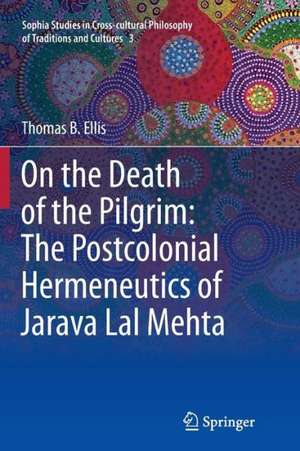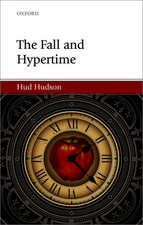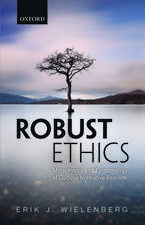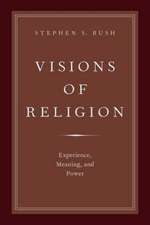On the Death of the Pilgrim: The Postcolonial Hermeneutics of Jarava Lal Mehta: Sophia Studies in Cross-cultural Philosophy of Traditions and Cultures, cartea 3
Autor Thomas B. Ellisen Limba Engleză Paperback – 14 dec 2014
| Toate formatele și edițiile | Preț | Express |
|---|---|---|
| Paperback (1) | 554.67 lei 38-44 zile | |
| SPRINGER NETHERLANDS – 14 dec 2014 | 554.67 lei 38-44 zile | |
| Hardback (1) | 565.33 lei 38-44 zile | |
| SPRINGER NETHERLANDS – 21 noi 2012 | 565.33 lei 38-44 zile |
Din seria Sophia Studies in Cross-cultural Philosophy of Traditions and Cultures
-
 Preț: 395.25 lei
Preț: 395.25 lei - 18%
 Preț: 726.69 lei
Preț: 726.69 lei - 15%
 Preț: 701.72 lei
Preț: 701.72 lei - 15%
 Preț: 651.67 lei
Preț: 651.67 lei - 18%
 Preț: 736.32 lei
Preț: 736.32 lei - 18%
 Preț: 782.10 lei
Preț: 782.10 lei -
 Preț: 375.53 lei
Preț: 375.53 lei - 24%
 Preț: 1038.21 lei
Preț: 1038.21 lei -
 Preț: 375.45 lei
Preț: 375.45 lei - 20%
 Preț: 570.73 lei
Preț: 570.73 lei -
 Preț: 376.15 lei
Preț: 376.15 lei -
 Preț: 378.64 lei
Preț: 378.64 lei -
 Preț: 377.55 lei
Preț: 377.55 lei - 20%
 Preț: 559.21 lei
Preț: 559.21 lei - 20%
 Preț: 568.44 lei
Preț: 568.44 lei - 20%
 Preț: 511.16 lei
Preț: 511.16 lei - 20%
 Preț: 559.21 lei
Preț: 559.21 lei - 20%
 Preț: 567.63 lei
Preț: 567.63 lei - 24%
 Preț: 590.54 lei
Preț: 590.54 lei - 24%
 Preț: 794.98 lei
Preț: 794.98 lei - 24%
 Preț: 585.65 lei
Preț: 585.65 lei - 20%
 Preț: 521.58 lei
Preț: 521.58 lei -
 Preț: 378.64 lei
Preț: 378.64 lei -
 Preț: 479.29 lei
Preț: 479.29 lei - 20%
 Preț: 569.86 lei
Preț: 569.86 lei - 15%
 Preț: 578.67 lei
Preț: 578.67 lei - 20%
 Preț: 556.90 lei
Preț: 556.90 lei - 18%
 Preț: 949.10 lei
Preț: 949.10 lei
Preț: 554.67 lei
Preț vechi: 693.34 lei
-20% Nou
Puncte Express: 832
Preț estimativ în valută:
106.15€ • 110.41$ • 87.63£
106.15€ • 110.41$ • 87.63£
Carte tipărită la comandă
Livrare economică 09-15 aprilie
Preluare comenzi: 021 569.72.76
Specificații
ISBN-13: 9789400798113
ISBN-10: 9400798113
Pagini: 224
Ilustrații: XII, 212 p.
Dimensiuni: 155 x 235 x 12 mm
Greutate: 0.32 kg
Ediția:2013
Editura: SPRINGER NETHERLANDS
Colecția Springer
Seria Sophia Studies in Cross-cultural Philosophy of Traditions and Cultures
Locul publicării:Dordrecht, Netherlands
ISBN-10: 9400798113
Pagini: 224
Ilustrații: XII, 212 p.
Dimensiuni: 155 x 235 x 12 mm
Greutate: 0.32 kg
Ediția:2013
Editura: SPRINGER NETHERLANDS
Colecția Springer
Seria Sophia Studies in Cross-cultural Philosophy of Traditions and Cultures
Locul publicării:Dordrecht, Netherlands
Public țintă
ResearchCuprins
Introduction.- From Banaras to the West and and Back.- From Subcontinent to Continental.- Pilgrims and Pilgrimages.- Digging at the Roots: The Logic of the Hindu Tradition.- Heroes, Jewish Nomads, and Hindu Pilgrims: Ulysses, Abraham and Uddhava at the Cross- (cultural) – roads.- Bibliography.
Textul de pe ultima copertă
This searching examination of the life and philosophy of the twentieth-century Indian intellectual Jarava Lal Mehta details, among other things, his engagement with the oeuvres of Martin Heidegger, Hans-Georg Gadamer, and Jacques Derrida. It shows how Mehta’s sense of cross-cultural philosophy and religious thought were affected by these engagements, and maps the two key contributions Mehta made to the sum of human ideas. First, Mehta outlined what the author dubs a ‘postcolonial hermeneutics’ that uses the ‘ethnotrope’ of the pilgrim to challenge the philosophical hermeneutic emphasis on supplementation and augmentation. For Mehta, the hermeneutic encounter ruptures, rather than supplements, the self. Secondly, Mehta extended this concept of hermeneutics to interrogate the Hindu tradition, arriving at the concept of the ‘negative messianic’. In contrast to Derrida's emphasis on the 'one to come', Mehta shows how the Hindu bhakti model represents the very opposite, that is, the 'withdrawn other,' identifying thereby the ethical pitfalls of deconstructivism's emphasis on the messianic tradition. This is the only full-length study in English of this high-profile Hindu philosopher.
Caracteristici
The only full-length study of this important Hindu philosopher Identifies the ethical pitfalls of deconstructivism’s employment of the messianic and its implicit ties to ontotheology’s metaphysics of presence Extrapolates for the first time Mehta’s alternative to the philosophical hermeneutic emphasis on return and edification ?













